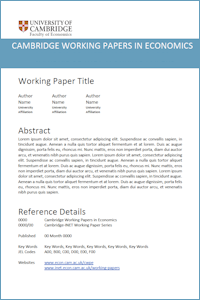
Clulow, Z., Reiner, D.
Democracy, economic development and low carbon energy: When and why does democratization promote energy transition?
CWPE2304
Abstract: Despite the growing consensus surrounding the need to decarbonize power for meeting the ambitious temperature target set out in the 2015 Paris Agreement, the share of low-carbon energy sources in the overall energy mix varies significantly across countries and over time. We evaluate the influence of democracy on clean energy transition by studying national solar, wind, hydro and nuclear energy shares of total energy use for electricity generation from 1980 to 2020. Using data from the Varieties of Democracy, Freedom House and Polity IV democracy indices, International Energy Agency Extended Energy Balances and Summary Statistics and World Bank World Development Indicators, we conduct a large-N study of the emissions levels of 135 countries. This article develops existing understandings about the relationship between democracy and energy transition by employing a more sophisticated – hierarchical – research design to determine whether: (i) democracy continues to be an important driver of low-carbon energy use once country-level clustering is accounted for, (ii) fluctuations in the democratic attributes of domestic political regimes have uniform effects across countries and (iii), if so, economic development plays a role in shaping the effect of democracy within individual countries. The results suggest that, even after controlling for country-level clustering and other putative drivers of energy portfolios, democracy has a significant effect on the low-carbon energy sources examined here. A second-order regression of country-specific democracy effects estimated by our hierarchical model provides robust evidence that economic development plays an important role in shaping the effect of democracy within individual countries: Strikingly, democratic spells (of increased democratic institutions and processes) in advanced economies tend to inhibit solar, wind and hydro energy, but promote nuclear energy use, while having the opposite effects (promoting solar, wind and hydro and inhibiting nuclear shares) in emerging economies.
Keywords: renewable energy, solar, wind, hydro, geothermal, nuclear, energy transition, decarbonization, democracy, electricity generation, energy mix, economic development
JEL Codes: N7 O13 P18 P28 P48 Q42 Q43 Q48
Author links:
PDF: https://www.econ.cam.ac.uk/research-files/repec/cam/pdf/cwpe2304.pdf 
EPRG Paper Link: 2218
Open Access Link: https://doi.org/10.17863/CAM.93376
